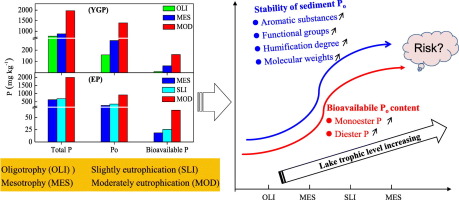Science of the Total Environment ( IF 8.2 ) Pub Date : 2018-10-17 , DOI: 10.1016/j.scitotenv.2018.10.233 Zhaokui Ni , Shengrui Wang , Bo-Tao Zhang , Yuemin Wang , Hong Li

|
Organic phosphorus (Po) constitutes the most important fraction of P in lake sediments, and the compositional properties of Po affect its behavior in lake ecosystems. In this study, 31P NMR, FT-IR spectroscopy, and UV–visible absorbance spectroscopy were combined to identify the dynamic composition of sediment Po across two sets of lakes in China ranging from oligotrophic to eutrophic, and their possible effects on lake eutrophication were evaluated. The results showed that sediment Po content (accounting for 24–75% of TP) was positively correlated with trophic status in both Eastern Plain and Yun-Gui Plateau lakes of China, and the linear relationship was more stable compared to total P (TP), implying that sediment Po may be a superior indicator of trophic status than TP. The Po component, phosphonate accounted for only 0.4% or less of Po, while the monoester P and diester P, accounted for 2–24% and 0.5–5% of Po, respectively, and were the main factors causing Po to increase with the increasing trophic status. The factors were closely related to the enhanced organic sewage load and intensification of contemporary sedimentation of phytoplankton. As trophic status increased, sediment Po might integrate into larger amounts of aromatic substances and functional groups, which could enhance the stability of Po in sediments. Furthermore, sediments from lakes with higher trophic status exhibited a higher degree of humification and molecular weights, which impart resistance to biodegradation, and therefore, reduced the risk of sediment Po release. However, the massive accumulation of bioavailable Po (monoester and diester P) allows possible degradation, supporting algal growth and maintains eutrophic status because there is abundant alkaline phosphatase in eutrophic lakes. Thus, to control lake eutrophication more effectively, targeted actions are urgently required to reduce the accumulation and degradation of Po in lake sediment.











































 京公网安备 11010802027423号
京公网安备 11010802027423号